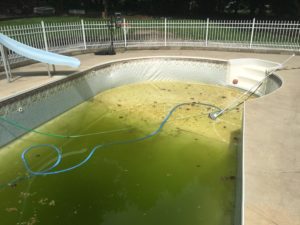Getting rid of yellow algae.
What causes yellow algae in pool.
Debris phosphates and pollen also can cause yellow algae and you re more likely to get algae in warmer climates or in areas with environmental and atmospheric changes.
It looks dry and powdery and is often mistaken for dirt or pollen.
When there is too much of a mineral present in the water it can begin to stain the pool.
Algae feed off nitrogen and thus form often after storms.
Mustard algae prefers the shade and likes still water so it s more likely to be seen clinging to the walls or bottom of the pool.
Commonly appearing after lightning storms these algae can form because of the buildup of nitrogen that lightning causes.
This algae in pools appear yellow or closer to a mustard color because it lacks chlorophyll.
Unlike algae iron deposits resist scrubbing and take a lot of elbow grease to remove.
Mustard algae sometimes called yellow algae loves to attach itself to the walls of swimming pools.
Though rare as far as algae varieties are concerned it can create tremendous frustration due to.
Containing chlorophyll algae utilizes photosynthesis to grow.
This type of algae usually requires chlorine plus an extra chemical like yellow out to finally get rid of it.
Also like any other algae it can stain your swimming pool and cloud the water which also sticking to things like pool equipment pool walls bathing suits floats and toys.
Shades of yellow can be a sign of excessive iron.
Mustard algae has a distinctive yellow color ranging from bright yellow to a deeper mustard yellow.
Yellow or mustard algae.
That is they take in carbon dioxide and expend oxygen as a byproduct.
A lack of good circulation filtration and sanitation is usually a contributing or the primary cause of pool algae.
This is due to it s ability to hide small cells of life deep in a crack or buried sufficiently that it can escape complete chlorination.
Iron can be introduced into a pool by well water or pipe corrosion somewhere in the pool system.
Algae are a living aquatic creature that multiplies rapidly on warm sunny days.

